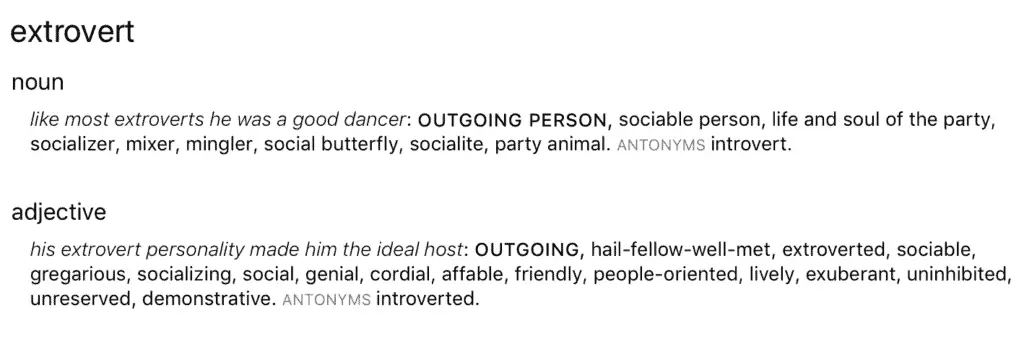What is an Introvert? (and Why We Need a Better Definition)

This post may contain affiliate links. If you decide to purchase through my links, I may earn a small commission. Read my disclosure page for more info.
You’ve stumbled upon this page because you’re curious: What is an introvert?
Maybe you’re an introvert searching for self-understanding, or perhaps you want to figure out what makes someone you know tick.
If either is true…keep reading.
Before I formulate a proper definition, let’s dispel some myths and misconceptions around introverts.
Let me first say, luckily you are here. Because if you would’ve looked up synonyms for ‘introverted’ in the thesaurus or dictionary, you would’ve found many, including:

Now, let’s talk about some of these because they perpetuate some common myths about introverts. And frankly, most of them aren’t flattering.
3 Common Myths About Introverts
1. If you’re introverted, you’re shy.
FALSE.
A common misconception is that an introvert is shy. And if you notice, words of a similar nature make up the first 6 synonyms listed in that dictionary.
We’re coming after YOU, Oxford Thesaurus.
When I tell people that I’m an introvert, they usually don’t believe me.
They see that I can socialize quite easily and enjoy chatting to colleagues at work. I like to make people laugh, I embellish stories, and I enjoy seeking out like-minded people for some good conversation.
So essentially, I’m not a shy person, and they mistake that for extroversion.
Although some introverts may be shy, this does not apply to all of us.
If you’re shy, you experience social-anxiety or become self-conscious when you’re around others. You’re quiet and might struggle to strike up a conversation with someone, ask them a question, or go to a social gathering with strangers.
Shyness is not something unique to introverts. In fact, introverts and extroverts everywhere on the spectrum can be shy when meeting new people or facing unfamiliar social situations.
The difference is, shy people can still be re-energized by these social situations. This is characteristically true of extroverts, not introverts.
On the other hand, introverts are drained of energy when socializing. It has nothing to do with confidence in meeting new people.
Introverts may or may not also be shy, but the two aren’t always connected.
Related Read: 7 Ways Your Job is Draining You (and How to Fix It)
2. If you’re introverted, you’re self-absorbed.
FALSE again.
Introverts thrive on introspection and reflection. We spend A LOT of time in our heads.
During these moments, we tend to:
- reflect on past experiences
- think about our future goals
- dissect and examine the happenings of our daily lives
- think (way too long) about what to say to someone
- or simply let our imaginations run wild.
However, from an outsider’s perspective, this seems as if we don’t care about others and only care about ourselves.
This isn’t necessarily true, and in most cases not true at all.
There’s a difference between being self-absorbed and reflective.
Think about the difference between being a self-absorbed person and an introspective or reflective person. These words have very different connotations.
Self-absorbed implies that you’re overly-obsessed with yourself. It suggests an overabundance of pride, ego, and a fondness for self-flattery.
On the other hand, introspection and reflection don’t stem from a self-centered impulse or drive.
An introspective and reflective person enjoys examining the inner-workings of their mind, emotions, and experiences. Everything that happens to them, internally and externally, becomes more food for thought.
Introverts may ask themselves questions along the lines of:
- What makes me tick?
- Why did I react that way?
- What is the root cause of my current emotional state?
- Why am I struggling so much with_____?
- I wonder why that happened today, and what could’ve been done differently?
These questions are more about determining strengths and weaknesses rather than just focusing on one’s strengths. We’re figuring out more about ourselves and trying to determine how the world and the people around us operate.
The ego isn’t at work here. Instead, it comes from a desire for self-growth.
Now of course, some introverts may be self-absorbed. But once again, this is not unique to introverts and the generalization is, well, not appreciated.
3. If you’re introverted, something is wrong with you.
Well, to that I ask: Who is judging?
Some say we live in a “man’s world” (I tend to agree), but regardless of your opinion we DO live in an extrovert’s world.
Just look at the synonyms for ‘extrovert’ and ‘extroverted’: outgoing, sociable, life of the party, genial, affable, friendly.

Oxford Thesaurus…you’re just not doing very well.
Remarkably, extroverts are awarded positive associations while introverts get the negative ones.
This makes introverts feel like something is wrong with us.
Society doesn’t appear to understand us and definitely doesn’t perceive us favorably.
Who wants a ‘thinker’ when you can have someone “friendly” and “outgoing”?
Is this “extrovert” bias changing?
The good news is: yes, kind of.
Since Carl Jung first introduced the idea in 1921 that people either favor an ‘inner world’ or ‘outer world’, introversion has been increasingly understood and accepted.
The popularity of the Myers-Briggs Type Indicator (MBTI) personality test has only furthered appreciation and exploration of introversion. Introversion and extroversion are now recognized as a spectrum. MBTI diversifies the term and includes people prone to Intuition/Sensing, Thinking/Feeling, Perceiving/Judging.
Now, introverts and extroverts can be seen as more dynamic and diverse, rather than someone who simply “likes being alone” or “likes being with others.”
No two introverts OR extroverts are the same.
Unfortunately though, extroversion is still widely viewed as the norm. Society still values gregarious people, the “life of the party”, or that bold, outspoken leader.
Whether we care to admit it or not, we still perceive one personality type as superior to the other.
All introverts hope for is acceptance and understanding. We don’t need to be fixed, mollycoddled, or converted into extroverts. We just have different preferences and ways of living to the extroverted “norms”.
Nothing’s wrong with us; we’re just different.
Related Read: How Introverts and Extroverts Spend Money Differently
What is an introvert and how are they different?
1. Introverts need more time for introspection.
Earlier we drew a line between introspection and self-absorption, so the next question becomes:
Why do introverts need so much introspection time?
If you haven’t checked out Riskology.co for their section titled: “The Science of Introversion: What It Really Is” then you should. But I will do my best to summarize all the science…
We aren’t just talking about personal preferences, but physical differences in the brains of extroverts and introverts.
It has to do with dopamine and acetylcholine.
The difference is in how extroverts and introverts respond to dopamine.
When an extrovert is conversing with friends at a social gathering, dopamine is released and the extrovert’s brain thriiiiives on this. The chemical rush of happiness and pleasure flows through them. They’re just buzzing and soaking up all that social energy around them.
Introverts on the other hand, respond a bit differently to the same situation and that same dopamine.
Introverts’ brains are more sensitive to dopamine. This can result in them feeling overly-stimulated by these situations.
Suddenly we aren’t just sitting at a restaurant chatting with friends: we’re standing on the surface of the sun getting burned alive.
Introverts counter the effects of dopamine by basking in the glow of acetylcholine.
Acetylcholine is similar to dopamine—both are neurotransmitters linked to pleasure.
Except unlike dopamine, acetylcholine shifts our thinking inward. Acetylcholine gives us the ability to shut out the chaotic world and focus on just one thing. We can think deeply and fuel our extended moments of introspection and reflection.
Introverts feel happiness and pleasure when we’re lost in our own thoughts, just like extroverts do when chatting people up at a party.
Introspection is necessary for us in order to feel happy and be energized enough for the rest of life’s demands.
Give us our introspection! …Or else we may just collapse into a heap on the floor.
2. Introverts are just as friendly as extroverts.
Just because we need more alone time doesn’t mean that we don’t enjoy the company of others.
On the contrary, introverts relish deep conversations with one, two, maybe even a small group, of people at a time.
Introverts dwell in the realm of ideas. We don’t enjoy small talk or having the same, surface-level conversation 20 times at a networking event or social gathering.
How many times do I have to smile and say my name and where I’m from? Ugh…
Small talk drains us. Deep conversations energize us.
When we’re chatting away about politics, philosophy, relationships, and shared experiences, it’s like we’re sitting at home on our couch pondering life’s many questions in solitude.
If you engage us on this deeper level, introverts are the best people to have around. We’ll start chatting away and genuinely surprise you.
You might have to prompt us with good questions first, but once we start talking, we can go for hours.
3. Introverts have A LOT to share with the world.
Introverts are just as important to society as extroverts, even though extroverts are more valued in the workplace.
But the world needs a balance of the two. And there are many careers that suit introverts very well.
For all their time spent in their heads, introverts can come up with extremely creative ideas, different ways of solving and addressing problems, and original perspectives on diverse issues.
We don’t do all this thinking for nothing!
Unsurprisingly, introverts often write better than we speak. Writing gives us more time to put together our thoughts.
But give us the opportunity to contemplate our ideas and revise them 50 times, and we may just surprise you.
Related Read: A Simple Guide to Making (More) Money for Introverts
Introverts: A BETTER Definition
So, without further ado…
Here is our BETTER definition of what “introvert” truly means.
introvert (n) —
- values introspection and reflection
- dwells in the realm of ideas and prefers to think deeply and meaningfully about their experiences
- is drained by socializing, especially those involving lots of small talk
- is energized by time spent thinking and reflecting
- enjoys deep, meaningful conversations with others
- is no better, or worse, than an extrovert
Are you an introvert?
Do you agree with this BETTER definition, or would you like to add something?
I’d love to hear from you.
You might also find these other introvert articles helpful:
- 7 Reasons Why Introvert Make Less Money Than Extroverts
- 7 Ways Your Job is Draining You (and How to Fix It)
- 17 Perfect Jobs for Introverts That Won’t Drain Your Energy
- Why I’m Quitting My 9-5 and Only Semi-Freaking Out
- Top 10 Hilarious Introvert Memes (March 2020)
- Top 10 Hilarious Introvert Memes (April 2020)
